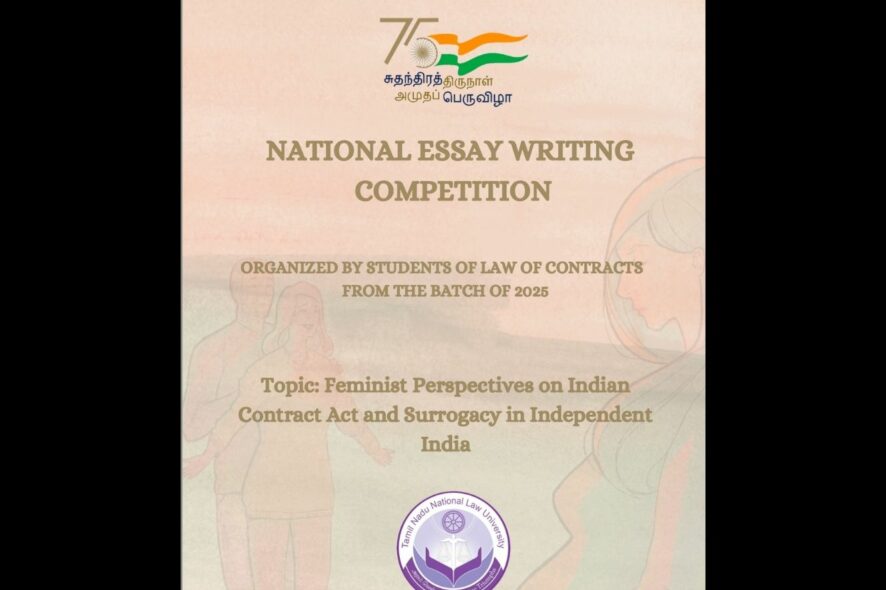About the Event:
Seventy-five years of Independence has witnessed changes in women’s roles and has opened up various opportunities for their growth and advancement in independent India. However, the social hierarchies faced by women are always hindering their well-being and growth. Surrogacy is one such issue where there is no clarity with regard to the rights and liabilities of the parties involved. Moreover, a proper regulatory mechanism does not exist.
The Indian Contract Act, 1872 is considered the basic law relating to contracts in India. As we are nearing our 75 years of Independence, it is high time we analyse the nexus between the Indian Contract Act, 1872 and the surrogacy contracts from a feminist perspective.
This national essay writing competition is organized by the students of the Batch of 2025, who are currently pursuing ‘Law of Contracts – II’, as part of the Suthanthira Thirunaal Amudha Peruvizha (STAP) initiatives to commemorate 75 years of Independence.
About STAP:
Azadi ka Amrit Mahotsav has been adapted to Tamil as Suthanthira Thirunaal Amudha Peruvizha (STAP). It is an initiative to celebrate and commemorate 75 years of India’s progress and the glorious history of its people, culture and achievements. It is an embodiment of India’s socio-cultural, political and economic identity. STAP is specially dedicated to the people of Tamil Nadu and the people of India, in general. As a part of STAP, TNNLU will be conducting various events from October 2021 to August 2022.
Topic of the Essay
Feminist Perspectives on Indian Contract Act and Surrogacy in Independent India.
Competition Timeline
Registration & Submission Deadline – December 31, 2021.
The first 50 entries will only be accepted. Winners will be notified through mail.
Eligibility
Undergraduate or Postgraduate students pursuing any discipline in any recognized University in India.
Registration Fee
No Registration Fee.
Awards & Certificates
The top 3 participants will be awarded certificates of merit. The essay of the winner will be published in the forthcoming issue of TNNLU Law Review.
Guidelines
- All essays must be written in English.
- Co-authorship is allowed.
- The format specified below has to be strictly adhered to.
- File type – All files submitted should be either in .doc or .docx with the file name as ‘Participant’s Name-Event Name’.
- Body – Times New Roman, size 12, line spacing 1.5, justified.
- Footnotes – ILI Rules of Footnoting, Times New Roman, size 10, line spacing 1, left-aligned.
- Endnotes are not to be used.
- Word Limit of essay (exclusive of footnotes) is a minimum of 3000 words and a maximum of 5000 words.
- All submissions must be accompanied by an abstract not exceeding 200 words.
- The body of the manuscript should not contain any personal details of the author, to enable anonymous screening.
- The work submitted should be original and unpublished and must not be under simultaneous consideration for publication elsewhere.
- The plagiarism limit should be less than 10%. The Organizing Committee reserves the right to use any plagiarism checker to vet the submissions.
- The entries should be submitted through this registration-cum-submission form only.
- The Organizing Committee reserves the right to publish or not publish the essays. In case of publication, the author(s) of the published essay(s) would be notified by the Organizing Committee.
- The entries would be assessed based on the following parameters: originality, relevance to the topic, coherence and content.
For any clarifications, please send an email to stapcontractlaws@tnnlu.ac.in OR reach out to the student coordinator, Mohamed Adnan Sami S – +91 79045 65959.
For competition brochure, click here.







